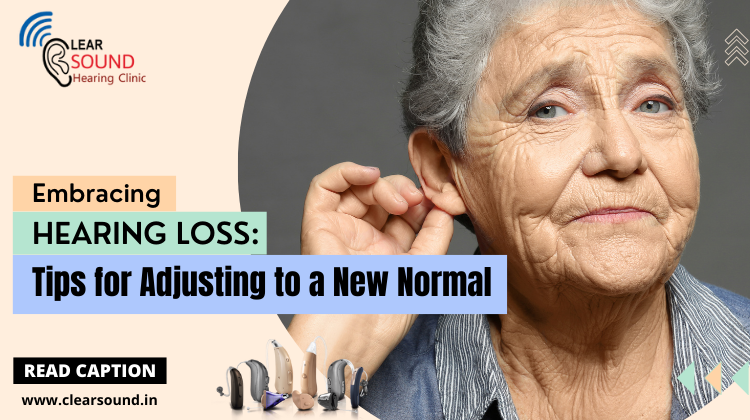
Embracing Hearing Loss: Tips for Adjusting to a New Normal
Hearing loss is a significant change that can impact many aspects of life. It’s essential to approach this adjustment period with patience and positivity. In this blog, we will explore various strategies and tips to help you or a loved one embrace hearing loss and adapt to the new normal.
Understanding Hearing Loss
Before diving into the adjustment strategies, it’s important to understand what hearing loss entails. Hearing loss can range from mild to profound and can affect one or both ears. Common causes include aging, exposure to loud noises, infections, and certain medical conditions. The impact of hearing loss is not just auditory; it can affect communication, social interactions, and overall quality of life.
Emotional Acceptance
1. Acknowledge Your Feelings
It’s natural to experience a range of emotions when diagnosed with hearing loss, including frustration, sadness, or even anger. Acknowledging these feelings is the first step toward emotional acceptance. Talking to a trusted friend, family member, or therapist can help process these emotions.
2. Seek Support
Joining a support group for individuals with hearing loss can provide a sense of community and understanding. Sharing experiences and coping strategies with others who face similar challenges can be incredibly empowering.
Practical Adjustments
1. Utilize Hearing Aids and Assistive Devices
Hearing aids and other assistive listening devices can significantly improve your ability to hear and communicate. Work closely with an audiologist to find the best device for your needs and ensure it is properly fitted and adjusted.
2. Make Your Environment Hearing-Friendly
Modify your environment to make it more hearing-friendly. Use visual alarms, install captioning devices for your television, and ensure good lighting to facilitate lip-reading. Rearrange furniture to encourage face-to-face conversations, which can help in understanding speech better.
Communication Strategies
1. Be Open About Your Hearing Loss
Inform your friends, family, and colleagues about your hearing loss. This transparency can foster understanding and patience. Let them know the best ways to communicate with you, such as speaking clearly, facing you while talking, and reducing background noise.
2. Practice Active Listening
Active listening involves more than just hearing words; it’s about understanding the speaker’s intent. Use visual cues like lip-reading and body language. Don’t hesitate to ask for repetitions or clarifications if you don’t understand something.
3. Use Technology
Take advantage of technology designed to assist with communication. Smartphones and tablets have apps that can transcribe speech to text in real-time, and many hearing aids now come with Bluetooth connectivity for easier phone conversations.
Maintaining Social Connections
1. Stay Socially Active
Hearing loss can sometimes lead to social isolation, but it’s important to stay socially active. Engage in activities and hobbies that you enjoy, and don’t shy away from social events. Your friends and family will appreciate your efforts to stay connected.
2. Find New Ways to Communicate
Explore different ways to communicate that may be easier for you. This could include written notes, text messages, or video calls with captions. Adapting these methods can help maintain strong connections with your loved ones.
Managing Stress and Fatigue
1. Take Breaks
Hearing with the help of hearing aids or assistive devices can be mentally exhausting. Take regular breaks to rest your ears and mind. Find a quiet space where you can relax without straining to hear.
2. Practice Mindfulness and Relaxation Techniques
Stress management techniques such as mindfulness, meditation, and deep breathing exercises can help reduce the mental fatigue associated with hearing loss. These practices can also improve your overall well-being.
Educate Yourself
1. Stay Informed
Knowledge is power. Stay informed about the latest developments in hearing aid technology, assistive devices, and strategies for managing hearing loss. This information can help you make informed decisions about your hearing health.
2. Advocate for Yourself
Don’t be afraid to advocate for your needs, whether it’s at work, in social settings, or within your family. Clearly communicate your needs and preferences to ensure that you can fully participate in conversations and activities.
Conclusion
Adjusting to hearing loss is a journey that requires time, patience, and a proactive approach. By embracing your new normal and utilizing the strategies outlined above, you can continue to live a fulfilling and connected life. Remember, you are not alone, and with the right support and resources, you can navigate this change successfully.








